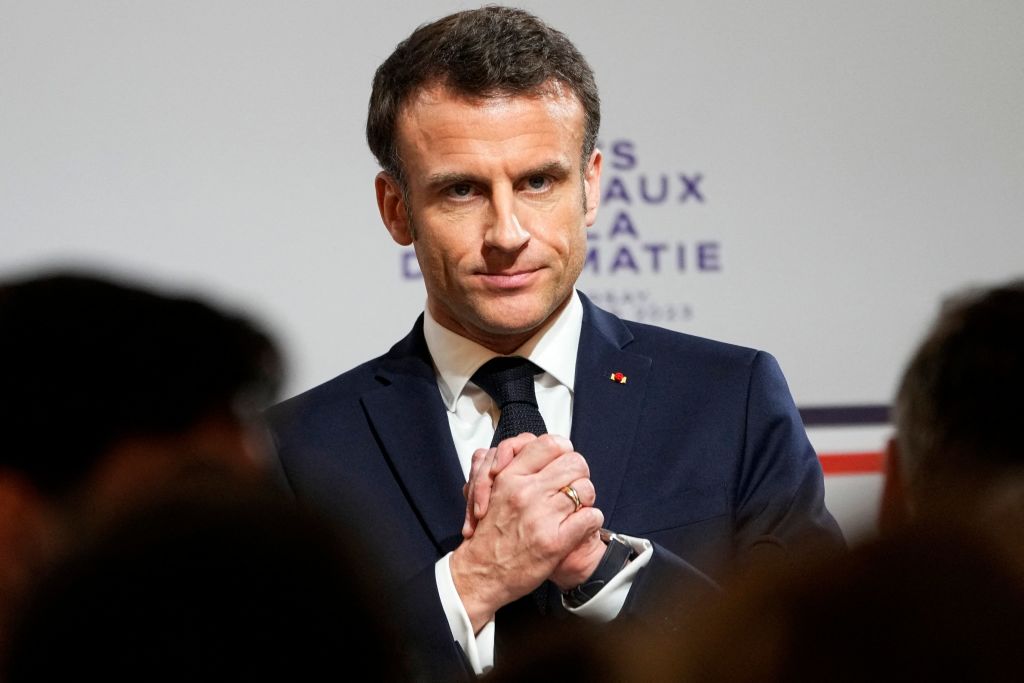The Paris Olympics is over and with it the “truce” that paused politics while France hosted the world’s elite athletes. Now, as the French return from their summer holidays, the serious business of governing begins again. There is only one problem: no party has a majority and Emmanuel Macron does not want to appoint the prime ministerial candidate suggested by the New Popular Front (NFP), the largest party — though without a majority — in the election earlier this summer.
Macron has been meeting with representatives from the NFP, as well as from France’s other parties, to ensure that the option which is best for “stability” is found. This is classic Macron. As with the “Great Debate” that followed the Gilets Jaunes, he plunges the country into chaos then he appeals to consensus and moderation, offering an image of democracy and political process while, in reality, power remains in Caesar’s hands.
The election threw up a situation in which the Right had the most votes but the system translated this into the Left winning the highest proportion of seats. All the while, power is still concentrated in the increasingly deranged centre. The disordered logic of the Fourth Republic has reconstituted itself within the Fifth, and Macron now finds himself with three options, none of which are ideal for him — or for the national stability he claims to crave.
First among these is the “technical government” advocated by current PM Gabriel Attal. This would see the acceptable faces of Left and Right band together around a reform program for the purposes of national unity. Attal has opened the door to the possibility that the prime minister of this coalition does not come from the “central bloc”, in an overture to the centre-left within the NFP.
However, this approach seems unlikely to work. On the Right, Laurent Wauquiez — who leads the Les Républicains dissidents that did not ally with the Rassemblement National (RN) — has refused to join any coalition. On the Left, the unity of the NFP remains surprisingly strong despite internal bickering, and the Macronists don’t even seem to believe in this plan themselves. They are preparing an austerity budget designed to “restrict the room for manoeuvre” of any future government, as one ministerial advisor put it.
The next option is the logical one — and arguably the only constitutional one — of allowing the NFP to appoint its chosen candidate, Lucie Castets, and waiting for the government to collapse thanks to its minority status. However, Macron has so far refused to do this, and the other Macronists also resent the idea. Attal has said that the centrist bloc in parliament will veto any government that contains ministers from Mélenchon’s party La France Insoumise (LFI). Mélenchon called Attal’s bluff this weekend, offering the possibility of an NFP government without LFI ministers in an echo of the original Popular Front which excluded the French Communist Party from ministerial positions.
However, other figures in the centrist bloc, such as François Bayrou, have let slip that the problem is the NFP’s programme, not the presence of Mélenchon’s allies. They fear that with Macron having set such a precedent for rule by decree, and with the RN in a sticky situation if cancelling proposed pension reform were put to a vote, the Left could pass reforms which would leave their legacy in tatters.
Even if the appointment of Castets might be the least testing option for the constitution, “legality” is apparently “not [Macron’s] primary concern” according to the aforementioned ministerial advisor. This leaves open another option: Macron appoints the PM he wants, democracy and elections be damned. LFI has said that it will move to impeach him if this occurs, using Article 68 of the Constitution to argue that the President would be acting “in breach of his duties” by refusing to select a widely agreed-upon candidate.
Whether this would pass is unclear: the rest of the Left might well join LFI in voting for impeachment, leaving the RN with a decisive role. Even if the rival parties chose to keep Macron in place, he would have proved his critics right in thinking that he is a leader with autocratic instincts and a limited regard for democracy.
Whichever of the options France’s President chooses, his eye is on the calendar. The next year looks to be one of gridlock and dysfunction, but he can call another election next July. Any government that does form will be but a limited reprieve from the diktat of Emperor Emmanuel.










Join the discussion
Join like minded readers that support our journalism by becoming a paid subscriber
To join the discussion in the comments, become a paid subscriber.
Join like minded readers that support our journalism, read unlimited articles and enjoy other subscriber-only benefits.
Subscribe